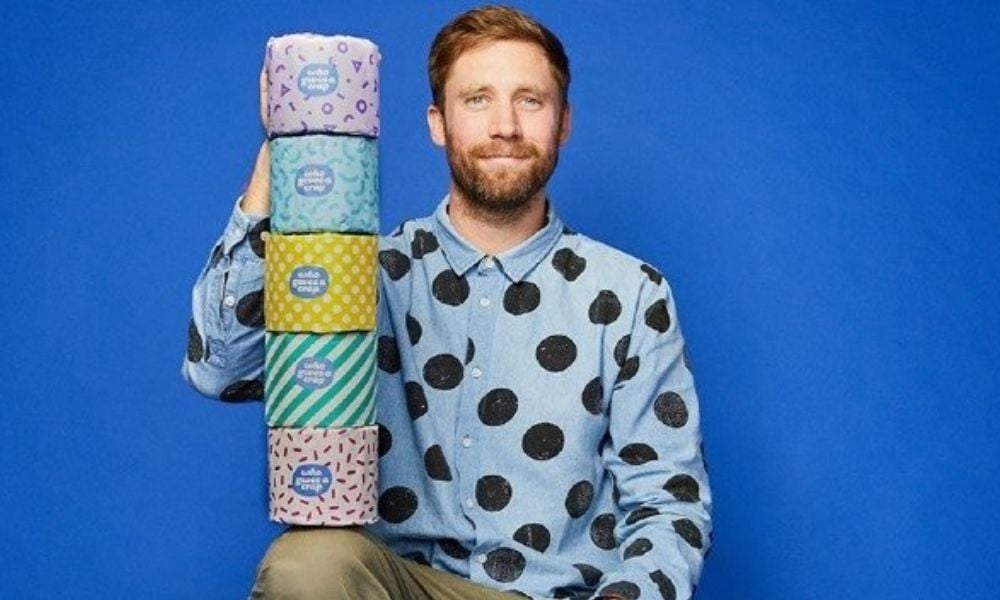
'Our belief is that if you look after your team, then everything flows from there'

In a world without thousands of employees heading into the office every day, what does company culture look like? No longer bound together by a shared location or the tradition of after-work drinks, organisations have had to rethink how to foster a great culture virtually.
For Simon Griffiths, co-founder of the social enterprise Who Gives A Crap, a thriving culture is one that means when the surf’s right, he can drop what he’s doing, grab his board and head out into the ocean. When Griffiths founded the B-Corp in 2009 with Jehan Ratnatunga and Danny Alexander, working remotely was baked into the company’s DNA. The trio were split across the globe between LA, Columbia, and Australia, but as they scaled from a handful of employees to their current workforce of 138, flexible working remained at its core.
“We started with a remote culture, because that was just normal, but it also benefitted our lifestyles a lot because it meant that none of us had to move to be in the same city together,” Griffiths said. “But it’s become more than that. We started this company because we wanted to have a positive impact on the world and we do that through our donations, but that thinking extends to our team as well. And our belief is that if you look after your team then everything flows from there.”
Read more: Flexible working: Is it given or is it earned?
Who Gives A Crap is a profit-for-purpose company delivering bulk toilet roll to customers via a subscription model. Half of the company’s profits are donated to help build toilets and improve sanitation in the developing world and so far, more than $10 million has been donated. But not only are customers giving back to those who need it most, their purchase is also good for the planet. Recycled, plastic free, and comparable to supermarket prices, it’s both sustainable and cost-effective.
Naturally for Who Gives A Crap employees, free toilet roll is a perk. But their employee value proposition goes far beyond that. Offering flexible working and the option to work overseas for three months at a time, Griffiths said they’ve built a culture around what is important to employees.
“People's managers know what those things are and we can help to move stuff around to enable people to do the things that we know are important to them,” he said. “Our philosophy is that if you're on a call with someone and you know they would rather be somewhere else, that's not a super fun call to be on. So, we want to try and figure out when those moments are going to happen, and then build structure around them so we can enable them to occur in a way that's really positive for the individual and therefore, the organisation.”
Read more: The Australian HR Awards are back and going virtual
But while building a strong digital culture is important, Griffiths acknowledged there’s power in bringing people together too. After the first few years as a fully remote organisation, they began hiring around hubs in Melbourne, LA and Manila, and employees worked in a hybrid way depending on how frequently they wanted to come into the office. In pre-pandemic times, employees came together once a year for an IRL (In Real Life) week and every two years, they visited partner organisations in places like the Philippines to see the impact the organisation has on the ground.
“That's something that we'd like to continue in the future, but it will probably have a different kind of slant to it given that travel has changed, at least for the next few years,” Griffiths said.
He believes a digital culture can be just as strong when people are separated by location. Likening it to the power of Reddit’s Wall Street Bets forum, which caused the Gamestop short squeeze earlier this year, Griffiths said building a strong digital culture is about tapping into what unites a group of people.
Having begun as a remote organisation, switching to working from home full-time during lockdowns was a fairly seamless process for WGAC’s workforce. But like every business, employees had their own struggles. To overcome some of those challenges, the company has invested in wellbeing through their partnership with Uprise, as well as a stipend to help employees set up their home office. On top of that, technology has played a vital role in recreating the collaborative office environment employees are missing.
“People say there's less spontaneity because we're not in the same office or going to get a glass of water from the water cooler at the same time,” he said. “But if you know that's important to your culture, it's easy to design for because you can build moments of spontaneity into the day.”